- Home
- Steve Rasnic Tem
Deadfall Hotel Page 2
Deadfall Hotel Read online
Page 2
But Richard was having odd feelings about this car: everything looked new, but the style of upholstery and trim seemed more suited to a much older vehicle, and Serena had avoided it, going directly into the house.
Something on the driver’s side door: was that a scratch? It made him unaccountably sad – why should he care? If Abby could see him now, she’d think he’d finally gone over the edge. It would’ve made her worry about Serena, of course. But now it was his full-time job to worry about Serena.
He’d caught himself thinking foolishly again. He didn’t know why the living felt so compelled to imagine what the dead might think. Richard could imagine the dead looking down from their private apartments in Heaven, gazing with a surfeit of arrogant pity at the poor, uncomprehending families they’d abandoned. Easier to imagine that, than to imagine nothing.
Then that place on the door wasn’t so much a scratch as a twisting line of rust, working its way through the paint and deep into the metal. That was worse, more disturbing somehow.
He bent close enough to see: reddish gold lettering, no more than a quarter-inch tall. Deadfall Hotel, in careful hand-drawn script.
“It’s a 1934 Ford, a Fordor they called them. De Luxe Sedan.”
Richard stood up too quickly, making himself dizzy. The man’s quick, strong hand on his shoulder steadied him. Richard looked up into the old man’s face.
“Are you ready for your interview?”
Richard nodded dumbly.
MR. ASCHER WATCHED Serena through the living room window. She was playing by herself, but she was happy. Or at least, she was singing. Richard thought that maybe happy didn’t matter as long as you had it in you to sing.
He supposed the man’s appearance was ordinary enough, but he found the overall effect to be pretty intimidating. Tall, almost a head taller than Richard. A little on the thin side. There was something odd about his profile. Richard eventually realized that the forehead and chin were pushed forward slightly, the nose pushed back, making the features somewhat moonish. Waxing crescent. He wore a dark, old-fashioned suit that looked too tight for him. A thin material, almost gauzy, close-fitting as if molded on. “Did your wife die by fire, by any chance?” Ascher asked.
Amazement got Richard to his feet, but then he saw what the fellow was looking at out in the yard. He pushed himself roughly to the window. Past Serena and on the other side of a low iron fence their neighbor had set fire to a hornet’s nest, which he now held high on its broken-off branch. Long, flowing locks of flame enveloped the darkened paper head. The burning nest began to open and the hornets rushed out in a scream. Serena looked stricken, and Richard considered, not for the first time, the terrible possibility that she had seen her mother die. But when he’d carried her out of the house, she’d been almost comatose from the smoke. He’d been sure she hadn’t seen anything.
Richard stuck his head out the window. “Serena, go play in the back yard, okay, honey?”
Serena gazed at him curiously, but did as he asked. Irritably, Richard moved away from the window, gesturing abruptly toward the nicer of the shabby living room chairs while he sank into the worst one, hiding the torn seat and back with his body. “Our house burned to the ground. My wife was inside. I couldn’t get her out. I don’t think Serena saw much of what happened, but I can’t be positive.” It was the bluntest, least emotional description he’d ever given of the event, but at least it was brief.
“I understand,” Ascher said, which angered Richard immensely, because it was a lie. “We human beings,” he continued, “are known for our inability to completely bury our dead.” Which angered Richard even more.
It may have been his anger that encouraged Richard to behave a little less obsequiously than he would have at a normal job interview. “So, you think you might have a job for me?”
Mr. Ascher looked at him with lips pursed, as if considering how to respond to Richard’s rudeness. “Possibly,” he finally said. “If it’s a job you want.”
“I can’t honestly say I know what I want, right now. At least among the things I can have. But I need a job. I need to be doing something useful. And as you saw, I have a daughter. But your ad wasn’t very specific.”
“Lovely young girl,” he replied. “A child who is special, I think.”
“I think so.”
“Permit me to introduce myself. I have been the proprietor of the Deadfall Hotel for over thirty years. Until I placed that small, uninformative ad. The ad which you did respond to, despite its unfortunate lack of detail.”
“As I said. I do need a job.” Richard knew he was acting like a sullen child, but he couldn’t help himself.
“In any case, my former position is now vacant. Currently I am the hotel’s, how do you say, caretaker, or perhaps, handy man. I like the sound of that better, I think. Handy man – it sounds so competent.”
“So you were demoted, Mr. Ascher,” Richard said.
“I prefer Jacob.” He smiled.
“Jacob.”
“Thank you. And I was not demoted. I merely changed jobs. It is part of the tradition.”
“So it’s a job with a tradition. I think I may be impressed.”
“No need. Do you want the job, Richard?”
“Just like that? You’d hire me just like that? What’s wrong with this job, Mister… Jacob?”
Jacob closed his eyes. After an uncomfortable silence he said, “It’s not an easy job. It can be a complicated job. At times, it can be a consuming job.”
“I have no hotel experience, you know.”
“I am aware of that lack in your resume, I assure you. But, how do they say it? No experience necessary. The fact that you even answered my little ad indicates, well, a certain aptitude, strangely enough.”
“I did work behind a counter at a convenience store when I was in college.” Now he felt ridiculous, an inexperienced youngster desperate for his first job.
“Splendid. The Deadfall has a very nice counter, although I prefer the phrase ‘front desk.’”
“My daughter needs special attention these days. I’ll need to spend a lot of time with her.”
“Certainly. Because of her mother. Old houses contain many secrets in their walls. Sometimes those secrets include faulty wiring. It wasn’t your fault, Richard.”
Richard stared at Jacob, unable to speak. He made himself change the subject. “What about Serena’s schooling? Is there a good local school?”
“Too far to be of any use, I’m afraid. There will be a private tutor – we have had her under contract for many years. Your daughter will have a first-class education, I assure you. Very few, in fact, could afford the quality of instruction we’ll be able to provide her at no cost to you.”
“She’ll miss her schoolmates.”
“That is unfortunate, of course. But perhaps this will be a useful time for her, a time of… development? Such close adult attention after a recent loss of this magnitude, it might be of great benefit, do you suppose?”
“I really have no idea. I haven’t a clue what might be best for her right now. I just want to do the right thing by her.”
“I first came to the Deadfall a number of years after the loss of my own family. In one terrible day, my wife, children, parents and grandparents: all of them, gone. I wandered the world for over two decades before landing in that place. Like you, I answered a small, rather obtuse advertisement. It has done me some good, I think.”
“I have no experience,” Richard said weakly, and teary-eyed.
“I will be there. It is like swimming, I think. It is like love. It is like grief. An experience of total immersion. You are afraid you may drown, but instead you learn to float, you learn to navigate. When I first came to the Deadfall it was as if I’d been dropped into a foreign country with only my wits to help me. I had to learn the customs, the language, and avoid the taboos. But I will be there to tell you the things you need to know. I can help you, Richard.”
HE HAD NEVER really enjoyed driving,
and after Abby died, his reluctance to get into an automobile became a prominent factor in their lives; some might have said it became pathological. So for him, the long drive to the Deadfall Hotel required a resolute rearrangement of his daily approach to the world. But he had little choice. No buses or trains went there, and one of the few things Jacob was firm about was that he was not permitted to take a cab or any other form of privately hired transport. Richard had thought to ask why, but he had understood so little in Jacob’s vague briefing that such a direct question would have seemed somehow nonsensical. The interview had gone on for hours after his acceptance of the position, but with very few questions asked or answered. Richard had spent most of that time trying to stay awake through Jacob’s seemingly pointless ramblings.
“Will there be a staff?” he had asked.
“Besides me, on an as-needed basis,” was the reply, “of course, there is Enid the cook, and her son, but I doubt you will see much of them. They like to keep to themselves. Occasionally you will see a housekeeper, a maid or two, but I would suggest that you not attempt conversation. Generally speaking, they dislike conversation. You might advise your daughter accordingly. I wouldn’t want her to feel slighted in any way.”
“But from what you’ve said, the hotel is rather large.”
“It can be, certainly.”
Now that was a funny way to put it. Richard wondered if Jacob might be foreign-born, or perhaps some variety of self-invented eccentric. It annoyed him, but he was pretty sure he could learn to tolerate it. “So how do you keep a place like that clean and running, with such a minimal staff?”
“I assure you,” Jacob replied, “this will not be a problem for you. You may remember, I said our clientele often have special proclivities, special needs.”
“As in handicapped?”
“Upon occasion, but that is not precisely the term I would use. In any case, they’ve usually made their own arrangements regarding food and hygiene matters. I really cannot share much information on these issues – I actually have little such information in my possession. The Deadfall is not merely a physical establishment – it is the embodiment of generations of agreements, understandings, pacts, covenants, promises, traditions enforced or simply encouraged, specific and nonspecific contractual negotiations, religious partnerships, spiritual compromises – the bulk of which occurred long before my own birth. There are important pledges and rituals of privacy which must be adhered to. I have, perhaps, revealed too much already, I’m afraid.” For the first time Jacob had seemed somewhat agitated.
“There’s no danger, is there?” Richard asked. “I mean, I can’t possibly put Serena in any sort of danger.”
Jacob looked at him directly then. “No more so than in any larger community. In any city, certainly. I’m afraid we must all look out for the children. That has always been so, I think. But I must get back. I will prepare for your arrival in two weeks. Please” – he moved forward and grasped Richard’s hand – “please trust me. In the long term, this will be a good thing for you, and your daughter. I know this from experience, and I pledge my assistance, in any way I can.”
And strangely enough, Richard did trust this man whom he knew nothing about. Trusted him enough to pay a local garage to repair Richard’s aging station wagon, kept in storage since Abby’s funeral. He told the owner-mechanic at the seedy-looking establishment to “ready it for a long, and possibly rough, trip,” and a week and two thousand dollars later the mechanic had delivered the vehicle to Richard’s front door, exposing an awkward smile when he handed him the keys, which now sported a bright blue rabbit’s foot attached to the ring.
At the mechanic’s insistence, two additional mirrors were now mounted on the driver’s and passenger’s side doors. “What with the trailer, and those winding mountain roads, you’ll want the extra visibility,” he’d said. Richard didn’t know if the mountain roads would be ‘winding,’ but there was no additional charge for the mirrors, so he was inclined to accept the mechanic’s good intentions.
The mirrors themselves weren’t terribly attractive: tall and extending far out on each side of the vehicle, they resembled the side-mirrors used on trucks. Serena said the station wagon now looked as if it had “big, ugly ears.” The new passenger side mirror bore the label: ‘Caution: objects in mirror are closer than they appear,’ just like the old passenger side mirror, which was still clearly visible, and offered a slightly different perspective, warping the world behind them. In fact, with his rearview mirror, Richard now had five mirrors to contend with. It was overkill. He thought of flying insects and their five eyes. He thought of staring into those eyes for the entire trip.
When Richard and Serena pulled out of the driveway for the last time, dragging the small, used trailer containing the few belongings they cared to keep, the car felt powerful, sounding almost nautical when it surged onto the highway.
Even before Abby’s death, Richard would never attempt drives of more than eight hours, but he was determined to make the Deadfall trip in a single effort. If he needed a nap they would pull over in some secluded place, but they would not leave this car except for bathroom breaks or food. He knew that to stop at some wood-sided roadside lodge would be to lose conviction, that doubt would flood in to fill the hesitation, and the next day they’d be on their way back to what passed for their home aboard some shiny bright bus, the car abandoned by the roadside. In a persistent daydream, he imagined a final scene in which the engine of that abandoned car purred at a fast idle as the bus pulled out. And the further away the bus traveled, the louder the engine’s roar became, until even miles away he and Serena would still hear it from inside the bus.
So they wouldn’t be stopping – they would travel on and on through hills and up into the mountains beyond, and toward the end of that effort the long drive would seem near-hallucinatory, the rising landscape a continuous upward bend on his perceptions, disrupting his thoughts, disorganizing his senses.
Serena was content to sleep most of the trip, which was just fine with him, as long as he could hear the sounds of her breathing from the back seat. Sometimes when he didn’t hear those soft, important sounds, or thought he didn’t hear them, he’d pull over to the side of the road, turn quickly in his seat, eyes scanning for the steady rise and fall of her beneath the blanket. Once he saw that subtle pulse of the cloth he could pull back onto the dark pavement again.
A few hours outside the city the engine altered its musical pitch, the old station wagon and its attached trailer began to labor ever-so-slightly, although as yet he could detect no other signs of an incline. But the somewhat troubling whine increased in volume, until finally he was aware of the hood of the car gradually tilting upwards. He could feel a pressure in his stomach, a gradual lowering of internal organs. Beyond the dark edge of the dashboard, the mountains massed. He’d had no idea that the mountains would be so close. He could think of only a few streets in the city with a detectable rise to them – he couldn’t understand how mountains could erupt so suddenly with so little effect on the tilt of the city close by.
“Daddy?” came Serena’s sleepy voice out of the back seat. “We’re in the mountains already? Why didn’t you wake me up?”
“They’re not as close as they look, honey.” But he wasn’t really positive about that. As long as he’d lived in the city – almost twelve years – he’d traveled into the mountains only once before, and that when Abby forced the issue. No – twice, he corrected himself. And Abby had forced it that time as well, to scatter her ashes.
“When I was little, I used to think all my good dreams floated up into the mountains,” Serena said softly. “But that the bad dreams, the nightmares, they floated down from the mountains, and through the city streets until they found the bedroom they were looking for. Isn’t that funny, Daddy?”
“Very,” he replied, staring up at the dark, approaching slopes. Minutes later he could hear the regular breathing of her sleep.
So far he’d been pleased,
and surprised, by the performance of the old station wagon, even with a trailer attached. Now and again, in fact, he felt compelled to peek into all those mirrors to confirm that the trailer was still there. All the things left from a lifetime, and yet now they seemed to weigh next to nothing, to stack up to nothing. But maybe they hadn’t needed to bring even this much. What did you need, really, to make your way through a life? He and Serena had each other – that’s what was important.
When Serena was little, the three of them would take these long Sunday drives. It had seemed so delightfully old-fashioned, not the way Richard and Abby had thought of themselves at all. They’d just put a basket of snacks and sandwiches into the car and drive. Sometimes Abby would insist that Richard choose and pack everything himself, so that when they were out on the road she and Serena could paw through the goodies and be surprised, alternately praising him for his unexpectedly good taste, and heaping good-natured scorn on what they considered his odder choices. “Pimento cheese, Richard? Who in this family, pray-tell, has ever eaten pimento cheese?” Then she’d cackle like a mad woman, and from the back seat Serena would try to imitate her with often hilarious results.
On those wonderful days they would head back during sunset, Serena asleep on the backseat, Abby with her head against the window, gazing at the sky, at the houses passing into a stream of line and color, the line of her mouth extending her smile into shadow, and Richard would keep glancing at her, glancing at her, unable to keep his eyes away, even for safety, because never had she been more beautiful, and never had he loved her more.
He glanced now at the large convex passenger mirror, ‘Caution: objects in mirror are closer than they appear,’ and saw the reflection of a reflection, his beloved wife’s face pressing against the inside of the window, staring at him and smiling that so-knowledgeable smile. He jerked his head toward the seat – of course there was nothing there. Nothing there. Abby was just part of all that nothing he had left in the life behind.
He leaned over and switched the radio on, careful to keep the volume low so it wouldn’t disturb Serena. Distant radio stations came and went, traveling at high speed into some other time, breaking apart in their haste. Richard, she sighed from the dashboard speaker, fogging ever so slightly the windshield above. A flutter and a shudder of bird wings swept through the radio air. Are you sure this trip is necessary? The radio whined, then began coughing static.

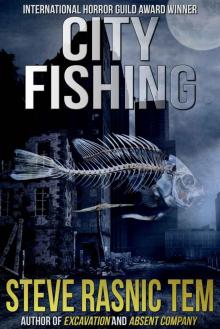 City Fishing
City Fishing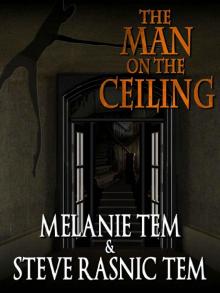 The Man on the Ceiling
The Man on the Ceiling The Book of Days
The Book of Days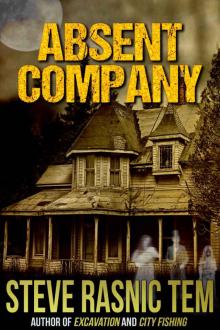 Absent Company
Absent Company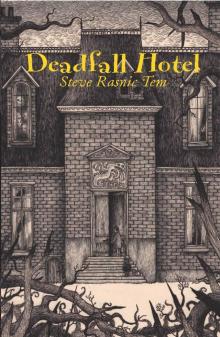 Deadfall Hotel
Deadfall Hotel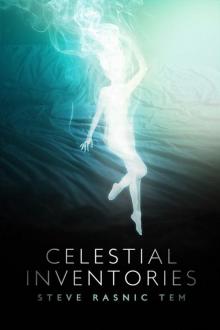 Celestial Inventories
Celestial Inventories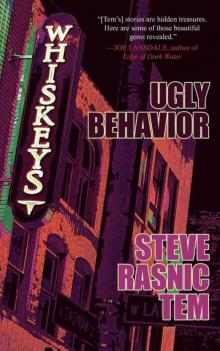 Ugly Behavior
Ugly Behavior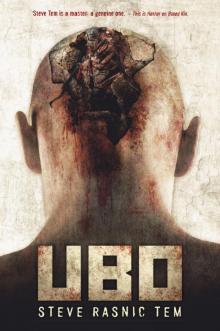 Ubo
Ubo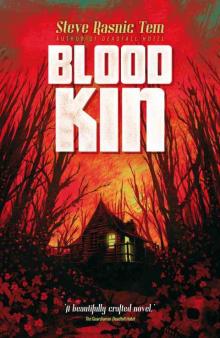 Blood Kin
Blood Kin